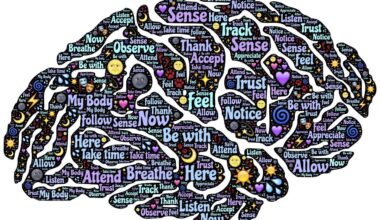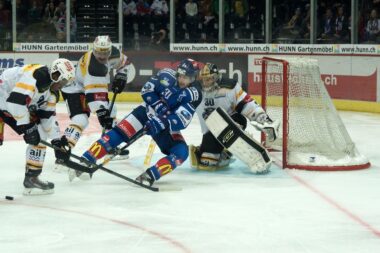The Role of a Coach in Ice Hockey Team Success
In the fast-paced world of ice hockey, the role of a coach is crucial. Coaches not only develop strategies for winning games, but they also play an essential part in building team dynamics. A successful coach must possess both tactical knowledge and the ability to inspire players. Communication skills are fundamental, empowering coaches to convey their strategies effectively. Understanding the players’ strengths and weaknesses allows coaches to tailor training sessions to maximize potential. Furthermore, they must foster a positive environment that promotes teamwork and resilience. Team cohesion often leads to better performance on the ice and enhanced morale off it. Coaches also serve as mentors, guiding players through the ups and downs of competitive sports. Their influence can help players overcome personal challenges and improve their mental fortitude. This mentorship extends beyond technical skills and includes life lessons that contribute to personal growth. Therefore, the multifaceted role of a coach contributes significantly to the overall success of an ice hockey team, intertwining preparation, motivation, and leadership skills into a cohesive approach.
The tactical approach of an ice hockey coach is also vital. Developing effective game strategies involves thorough analysis of opponents and an understanding of the ever-evolving game dynamics. Coaches spend hours studying film, breaking down plays, and rehearsing scenarios. Teams often practice specific strategies designed to counteract their opponents’ strengths while capitalizing on weaknesses. This preparation takes preseason planning, in-season adjustments, and real-time decision-making during games. Each game presents unique challenges requiring agile thinking and adaptability from coaches. During matches, they must make split-second decisions that influence outcomes, such as choosing line combinations or adjusting strategies on the fly. The ability to read the game, understand flow, and anticipate changes instills trust in players. Furthermore, successful coaches foster a collaborative environment, encouraging players to engage in the strategic process. This exchange of ideas develops critical thinking amongst players, leading to a more dynamic and responsive team. Consequently, a coach’s tactical expertise acts as the backbone of a highly competitive ice hockey team, shaping not only how they play but also how they thrive.
Building Strong Relationships
The relationship between a coach and players forms the foundation of a successful ice hockey team. A coach who invests time in understanding their players’ personalities fosters mutual respect. Engaging with players on a personal level creates a supportive atmosphere that encourages open communication. Regular check-ins and discussions about performance promote trust and understanding. This relationship allows players to express concerns and seek guidance, ultimately improving their performance. Additionally, by recognizing and celebrating individual achievements, coaches can boost players’ confidence and motivate them to reach their full potential. Moreover, this strong bond becomes essential during challenging seasons. When players face adversity, the support from a coach can encourage resilience and commitment. They must also navigate conflicts and disagreements, ensuring that team unity remains intact. By fostering an inclusive environment, coaches can help diverse personalities to coexist and work harmoniously. This positive environment ultimately leads to better teamwork on and off the ice. Thus, building strong relationships significantly impacts a team’s success and can elevate ice hockey performance to new heights.
Furthermore, effective ice hockey coaches implement individualized training regimes that cater to the diverse skill sets within their teams. Recognizing that each player has unique strengths and areas for development enables coaches to enhance overall performance. Individualized training focuses on improving specific skills, whether it’s shooting accuracy or defensive positioning. These tailored sessions show a coach’s commitment to each player’s success, fostering loyalty and motivation. Coaches who prioritize personal development can help athletes refine their technique and elevate their game performance. This holistic approach nurtures players, making them feel valued within the organization. Moreover, these individualized plans often incorporate feedback mechanisms to ensure progress measurements are consistent. Coaches must provide constructive feedback and encouragement to sustain improvement and keep athletes engaged. Such attention not only enhances individual performance but contributes to the team’s success. Coaches also benefit from being adaptable, as changes in players’ abilities over time may necessitate adjustments in training routines. Therefore, personalized development contributes significantly to creating moments of success that define the overall trajectory of the team.
Leadership and Motivation
Leadership is a cornerstone of effective ice hockey coaching, influencing every aspect of the team’s performance. A coach’s ability to inspire and motivate players can lead to an unparalleled level of commitment. When players resonate with a coach’s vision, their dedication improves, driving them to excel during practices and games. A leader in this context promotes a culture of accountability, urging players to take responsibility for their actions on and off the ice. Establishing clear expectations regarding performance and conduct helps to create a disciplined environment. Furthermore, motivational strategies are essential for fostering resilience, especially during tough seasons. Coaches often utilize team-building exercises and positive reinforcement techniques to keep spirits high. Engaging players emotionally can build a cohesive unit, where each individual feels a strong connection to the team’s objectives. Additionally, recognizing and addressing player fatigue or burnout is crucial for maintaining peak performance levels. A motivated team is more likely to push through challenges and work together toward their goals. Therefore, a coach’s leadership and motivational prowess significantly impact team dynamics and success.
Moreover, coaches are responsible for instilling a sense of discipline within their teams, crucial for ice hockey success. Discipline encompasses both physical training and adherence to team rules. A structured practice routine ensures that players develop the necessary skills while learning game tactics. Coaches design drills emphasizing teamwork, communication, and individual skill refinement, laying the groundwork for effective execution during matches. Additionally, discipline translates to in-game scenarios, where players must follow strategic instructions and maintain composure under pressure. A disciplined team minimizes penalties and maximizes opportunities to seize advantages over opponents. Coaches also instill a work ethic that aligns with the demands of high-level ice hockey, emphasizing dedication, focus, and perseverance. Establishing a culture of discipline promotes accountability among players, encouraging a collective effort toward excellence. Coaches must also model disciplined behavior, leading by example in training sessions, interactions with referees, and adherence to league regulations. This emphasis on discipline ultimately fosters a professional atmosphere conducive to success, enabling the team to perform at its highest potential. Thus, discipline forms a fundamental aspect that influences a team’s overall performance.
Conclusion
In conclusion, the role of a coach in ice hockey extends beyond simply strategizing for victories. It encompasses the development of strong relationships, personalized training, leadership, and instilling discipline. Success is not only measured by the scoreline, but also by the growth and camaraderie cultivated within the team. A coach’s influence shapes not only individual players but also the collective identity of the team. The combination of tactical acumen, motivational leadership, and interpersonal skills forms the cornerstone of effective coaching. The impact of a coach can last a lifetime, imparting valuable life practices that extend beyond the game. Success often blossoms in an environment where players feel secure, motivated, and guided. As ice hockey continues to evolve, the role of the coach remains paramount in navigating the complexities of the sport. Coaches stand as the torchbearers of passion, resilience, and excellence, ensuring that teams excel both on and off the ice. Ultimately, the importance of excellent coaching cannot be understated; it is pivotal in shaping the future of ice hockey.





